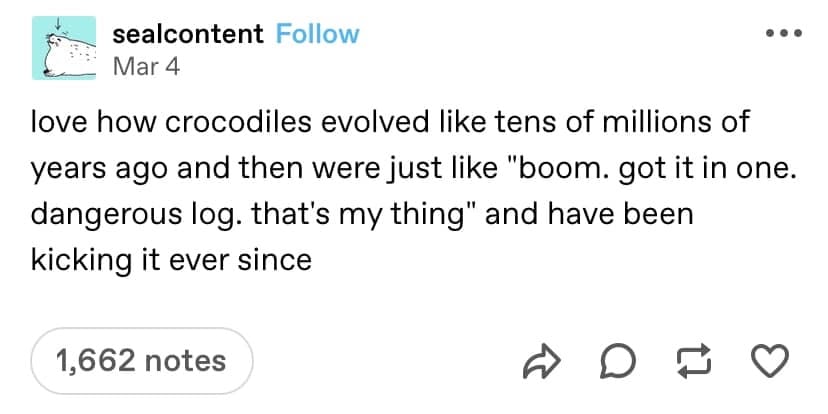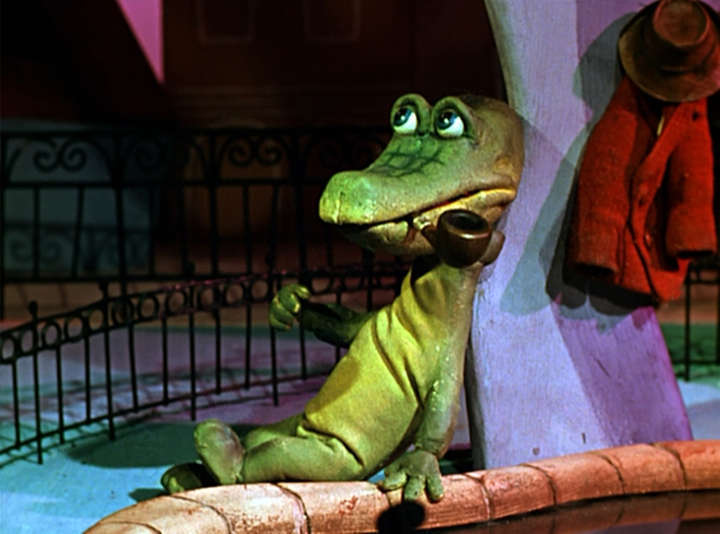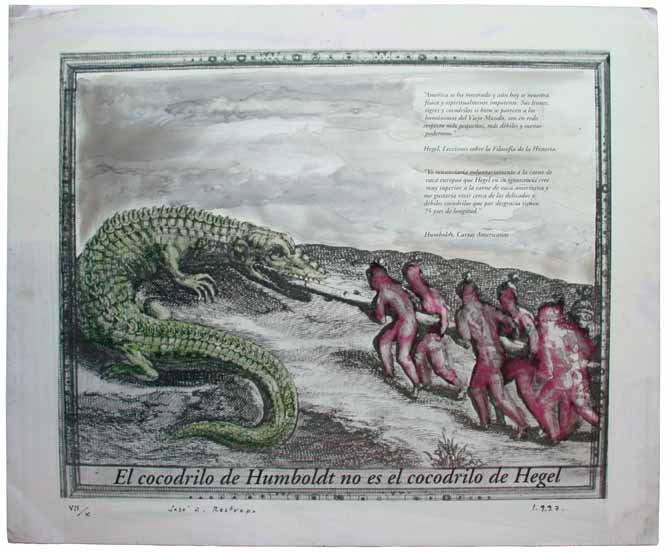The Problem of the Crocodile
We were sitting out on camping chairs around a haphazardly constructed table that was too small, and had just about ordered our third round of spicedivers – cold beer with a lime wedge covered in hot sauce drowned in it.
“The problem of the crocodile”, I said, “is how they evolved like tens of millions of years ago and then were just like 'boom. got it in one. dangerous log. that's my thing' and have been kicking it ever since.”

“The problem of the crocodile”, Hernan said, “is how the Brazilian right once featured talking airheads fighting the Covid-19 vaccine with the claim that the vaccine would turn you into a crocodile. Only ‘delirios comunistas’ would ever advocate for vaccination, they said, and Brazilian communists began reptilizing. For months,” Hernan went on, “party buildings were left half-submerged under water; and in some places, party business was completely transferred into the subterranean wet, into the labyrinthine sewer systems of Belo Horizonte, of Recife, of Porto Alegre. The communists would be sitting next to the stream of fat and feces, next to the reeking flow that, elsewhere, was read for Covid-19 traces, and read it for indices of coming worlds like in the entrails of an Etruscan deer. Divining futures. Keeping danger logs. The slapping of their tails counted the rhythm.”
He tapped on the table, twice, as if to quote them.
“Teenage Mutant Bolsh Caymans”, Reiko nodded.
“They had the greatest poster designs!”, Laura exclaimed.

“Mostly they just answered e-mails”, Hernan said. “The sewers were blue with the screen of their light. Therefore, the problem of the crocodile is the problem of the future.”
“The problem of the crocodile”, Adaku said, “is how in Antony and Cleopatra, Antony thinks it’s really funny to fuck with Lepidus like this:
LEPIDUS: What manner o’ thing is your crocodile?
ANTONY: It is shaped, sir, like itself, and it is as broad as it hath breadth. It is just so high as it is, and moves with it own organs. It lives by that which nourisheth it, and the elements once out of it, it transmigrates.
LEPIDUS: What color is it of?
ANTONY: Of it own color, too.
LEPIDUS: ’Tis a strange serpent.
ANTONY: ’Tis so, and the tears of it are wet.
Or worse: he might think it’s strategy. He might think it’s tactics. Go on boy, give Lepidus nothing. Except itself.”
“Dangerous tauto-log”, Tzusing said.
“Is the problem of this crocodile conservatism?”, Hernan asked. “Or is this still – already – radical?”
“Maybe Antony knew”, Adaku said, “that in some other corner of the empire, Cassius Dio was writing: ‘let no one count him a Roman, but rather an Egyptian, nor call him Antony, but rather Serapion; let no one think he was ever consul or imperator, but only gymnasiarch’. Maybe he knew that he would be considered primarily something else. Not shaped like himself, less broad than he had breadth: ‘for even in the past he was of no account’, Cassius continues.”
She took a large sip from her spicediver.
“Maybe Antony knew”, she continued, “that the problem of the crocodile is really all about accounting; and maybe he knew that after the defeat at Actium, the Egyptian galley on Roman coins would evolve into a crocodile tied to a palm tree, with the value – I – remaining ‘just so high as it is’.”

“But transformed from a mast into a tree”, Hernan said. “A delirio?”
“It transmigrates”, Adaku answered. “Therefore, the problem of the crocodile is the problem of value.”
Michal wiped a bit of sweat off her face.
“The problem of the crocodile”, Michal said, “is how the Soviet animated film Cheburashka featured the character Gena, who is a crocodile, and works in a zoo, as a crocodile.”
“Another dangerous tauto-log”, Tzusing said.
“But this is different”, Michal said, “because the crocodile can only work as a crocodile because it is not simply itself. Otherwise it could only be it. It couldn’t sell that. It could only be sold on the grounds of it, like Antony sells it. But it couldn’t really sell itself. Therefore, the problem of the crocodile is the problem of autofiction.”

We agreed that we would down our remaining drinks in one go and order a new round. We wanted the hot sauce even redder and stickier, the beer even colder, our tongues even heavier and our words with simultaneously more and less edge to them.
“The problem of the crocodile”, Laura said, “is how in my old home country, from back when” – she made a indecipherable gesture with her hand – “we had a whole song about how nobody knows what sound it makes.”
“That’s because Italy was still Rome, wasn’t it? Still not understanding that there’s Egypt somewhere, and that Egypt can account for something”, I said. “No wonder you have no idea what kind of sound a crocodile makes.”
“Do you?”, Adaku asked.
“It makes a sound like: ‘boom. got it in one. dangerous log. that’s my thing.’”
“The problem with the crocodile”, Reiko said, “is how in Simone Lappert’s poetry collection längst fällige verwilderung, there is this poem that goes
Es muss nicht immer
um den angriff gehen,”
“go tell that to Rome”, Hernan interrupted,
“sagt das krokodil,
mir reicht es
zu lauern
and this poem is entitled minimalismus although it precisely shows that the problem of the crocodile is therefore not the problem of minimalism but the problem of latency.”
“Maybe lauern is the least it can do”, Laura said.
“But that would mean lauern is even less than being identical to itself, because otherwise I’d have said that being identical to itself surely is the least it can do”, Reiko said.
“Not it if includes transmigration and thus the problem of value”, Adaku said. “Suddenly, being identical to oneself becomes very complicated.”
“But it allows you to earn money as ‘yourself’”, Michal said.
“The problem of the crocodile”, Tzusing said, “is how Hegel claims that the crocodiles of the New World, that is: alligators, are much smaller, weaker and more boring than the crocodiles of Africa, because the New World is that inferior to the very old one that is Africa. And how Humboldt then gets angry at Hegel because Humboldt considers the New World intellectually ‘his’ and finds it insulted by what he considers a mere stubenhocker Aristotle-cosplaying asshole and writes that the New World crocodiles are, in fact, 8m long and extremely dangerous but nevertheless excellent company.

Therefore, the problem of the crocodile is the problem of all phallic anxieties.”
“Of masts and trees as coins and values”, Laura said.
“Cassius writes”, Adaku says: “‘[Antony’s] physical fitness? But he has passed his prime and become effeminate. His strength of mind? But he plays the woman and has worn himself out with unnatural lust.’”
She downed her spicediver in one solid, committed go.
“That’s still about value. Remember what Marx wrote: ‘Allerdings schließt der Ausdruck: 1 Hose = 1 Rock oder 1 Hose = 1 Rock wert, auch die Rückbeziehung ein: 1 Rock = 1 Hose oder ›Rock wie Hose‹’.”
“Yeah”, said Era, who had so far been sitting silently. They almost startled us by speaking up so all of a sudden. It made us long for more drinks as the evening grew darker, nightwards.
“The problem of the crocodile lies in that passage from Effi Briest”, they said, “which goes like:
»Den ersten Abend, als du das Krokodil sahst, fandest du’s märchenhaft ...«
»Ja, damals ...«
»... Und dann, Effi, kann ich hier nicht gut fort, auch wenn es möglich wäre, das Haus zu verkaufen oder einen Tausch zu machen. Es ist damit ganz wie mit einer Absage nach Varzin hin. Ich kann hier in der Stadt die Leute nicht sagen lassen, Landrat Innstetten verkauft sein Haus, weil seine Frau den aufgeklebten kleinen Chinesen als Spuk an ihrem Bett gesehen hat. Dann bin ich verloren, Effi. Von solcher Lächerlichkeit kann man sich nie wieder erholen.«
»Ja, Geert, bist du denn so sicher, daß es so was nicht gibt?«
Will ich nicht behaupten. Es ist eine Sache, die man glauben und noch besser nicht glauben kann. Aber angenommen, es gäbe dergleichen, was schadet es? Daß in der Luft Bazillen herumfliegen, von denen du gehört haben wirst, ist viel schlimmer und gefährlicher als diese ganze Geistertummelage. Vorausgesetzt, daß sie sich tummeln, daß so was wirklich existiert. Und dann bin ich überrascht, solcher Furcht und Abneigung gerade bei dir zu begegnen, bei einer Briest. Das ist ja, wie wenn du aus einem kleinen Bürgerhause stammtest. Spuk ist ein Vorzug, wie Stammbaum und dergleichen, und ich kenne Familien, die sich ebensogern ihr Wappen nehmen ließen als ihre ›weiße Frau‹, die natürlich auch eine schwarze sein kann.«
“Oh”, said Hernan, “‘Geistertummelage’, that’s how you translate delirio into German.”
“I did tell you the problem of the crocodile is the problem of value, right?”, Adaku said. “‘Ihre ›weiße Frau‹, die natürlich auch eine schwarze sein kann’, it’s also a little bit ‘Rock wie Hose’, isn’t it? Transmigration.”
“Oder einen Tausch zu machen”, Michal agreed, or didn't, I couldn't tell, it had become quite dark by now and I started to get hungry, I started dreaming of clean silver fish chasing each other downstream, and of gazelles crossing a muddy river, and of the smell of bayou mangroves.
“‘For that we who are Romans and lords of the greatest and best portion of the world should be despised and trodden under foot by an Egyptian woman is unworthy of our fathers’, that's still Cassius”, Adaku said.
“What an ass”, Hernan said.
“Therefore”, Era said, “the problem of the crocodile is the problem of prestige – the high-bourgeois value of spooks – and of duration – the time that elapses until the crocodile becomes scary – and of the prohibition of incest and of the madwoman in the attic and the madwoman in the Actic.”
“But all those problems are the same problem”, Reiko protested, or didn't, at this point it was really too dark to tell and I was too drunk and so were all the others.
“Exactly”, Era answered.
“Of its own color, too”, Adaku nodded. “‘Ihre ›weiße Frau‹, die natürlich auch eine schwarze sein kann”.
“Sides of the same coin.” Tzusing stared into his glass.
And the rest of us, we stared at the sky and waited for a sewer whiff to appear on the breeze.